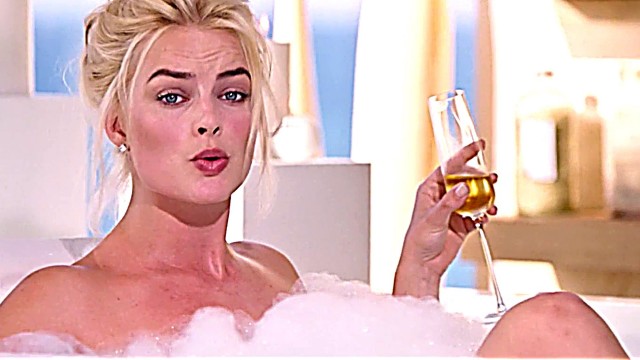Arguably, the economic crisis spurned by the housing bubble was the biggest story since 9/11. But, how much does the average person actually know about how or why the banking crisis happened? In the new faction film, The Big Short, Adam McKay attempts to explain a massively complicated and corrupt system whose levels of obfuscation are symbols for the levels of fraud they’re participating in.
If that sounds dry, McKay knows it. But, fortunately for us, Adam McKay is pissed off enough to care. He is pissed off Wall Street created a complicated house of cards (or, in his visual terms, Jenga tower) that collapsed the US Dollar. He’s pissed off that the economy is at the mercy of greedy maniacal sociopaths. He’s pissed off that the middle class got fucked over. And, he’s REALLY pissed off that nobody can understand what the fuck happened.
McKay, who also wrote the screenplay with Charles Randolph (The Interpreter, Love and Other Drugs), never minimizes words in The Big Short, but he also assumes that we don’t know what the fuck anything means. In order to keep our interest in the middle of the dry dialogues, he inserts Brechtian interstitials for his explanations. Anthony Bourdain uses his seafood menu to explain collateral debt obligations (CDOs), and Selena Gomez explains synthetic CDOs in Vegas.
The Big Short follows a group of men who saw the bubble bursting before it ever happened…and how they capitalized on it. Michael Burry (Christian Bale), a California hedge fund manager, is the first to see it, and makes obscene bets on the market failing. Jared Vennett (Ryan Gosling) gets wind of the failure, and passes information to trader Mark Baum (Steve Carell) while a couple of fledgling traders, Jamie Shipley (John Magaro) and Charlie Geller (Finn Wittrock), stumble onto the scheme and make their own bets with the help of retired banker Ben Rickert (Brad Pitt).
McKay’s fury means that nobody here is a hero. Vennett narrates the movie, but he’s the greediest and wiliest of the bunch. He works for a bank and is trying to get people to bet against him in order to make money off that. Burry is the hypocritical heart of the movie, operating as McKay’s mouthpiece spouting screeds against the whole system while simultaneously profiting from it under the blanket of Morgan Stanley. As such, here’s the contradiction that pisses McKay off: he knows that the American Dream is to make money and be as comfortable as possible, but these people are making their money by guaranteeing that others will fail. By making these assholes the protagonists of The Big Short, the audience is primed to root for their success, yet by rooting for their success the audience is rooting for their own failure.
The Big Short is a truly horrific movie. It’s also a comedy. It’s also a serious drama about the economy. It’s also a rags to riches success story. McKay manages to make all of these movies at once, sometimes fighting over the same scene. Just as Baum is learning the depths of Wall Street’s fraud, Vennett is mocking his rage, then we get a Selena Gomez interstitial, and Guns ‘n’ Roses’ Sweet Child O’ Mine blares underneath the soundtrack. McKay is giving you as much information as he can as entertainingly as he can while acknowledging all of the various hypocrisies at the center.
The Big Short is near perfect in its execution. Even though McKay is constantly explaining things to the audience, he’s never pandering to us. He knows we’re dumb about technical jargon, and gives us enough to make our own conclusions. His visual sense is wildly on point, and the soundtrack choices are reminiscent of Tarantino but moved up by 20 years. There’s a horrifying energy at work here. If the movie is ham-fisted at times, it’s only because McKay thinks it is important. Perhaps the biggest sign that this is a great movie is the understated horror he creates with his final title card, which, even after having your head slammed against the wall for two hours, hits like a ton of bricks.

